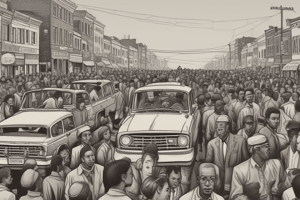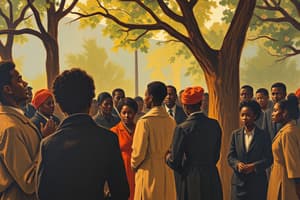Podcast
Questions and Answers
What does SNCC stand for?
What does SNCC stand for?
- Student Nonviolent Coordinating Committee (correct)
- Student Nonviolent Coalition Committee
- Student National Coordinating Committee
- Student Nonviolent Civil Rights Committee
Who was Fannie Lou Hamer?
Who was Fannie Lou Hamer?
An American voting rights activist and civil rights leader.
The event that resulted in the 1964 Civil Rights Act included __________ v. Board of Education.
The event that resulted in the 1964 Civil Rights Act included __________ v. Board of Education.
Brown
Alain Locke was the first African American Rhodes Scholar.
Alain Locke was the first African American Rhodes Scholar.
What did James Baldwin's essays explore?
What did James Baldwin's essays explore?
What was the Cuban Revolution?
What was the Cuban Revolution?
Who was Robert F. Williams?
Who was Robert F. Williams?
What is significant about the Montgomery Bus Boycott?
What is significant about the Montgomery Bus Boycott?
Flashcards are hidden until you start studying
Study Notes
SNCC
- Formed in 1960 as a pivotal organization in the American Civil Rights Movement.
- Emerging from a student meeting led by Ella Baker at Shaw University.
- Organizers of key events like sit-ins, Freedom Rides, and Freedom Summer, with a focus on voter registration for African Americans.
Fannie Lou Hamer
- Key activist and civil rights leader born in 1917 in Montgomery County, Mississippi.
- Worked as a sharecropper for 18 years before joining SNCC in 1962 as a field organizer.
- Suffered brutal police violence in 1963, raising awareness for civil rights issues.
- First African American woman delegate at the Democratic National Convention in 1968.
Events Leading to the 1964 Civil Rights Act
- Brown v. Board of Education (1954) challenged segregation in public schools.
- Rosa Parks' arrest in 1955 sparked the Montgomery Bus Boycott.
- Rise of the Student Nonviolent Coordinating Committee addressing civil rights through nonviolent action.
- Freedom Rides highlighted the injustices of segregation in interstate travel.
- Southern Christian Leadership Conference established in 1957 under Martin Luther King Jr.
- MLK's March on Washington in 1963 galvanized national support for civil rights.
Alain Locke
- First African American Rhodes Scholar in 1907, influential in the Harlem Renaissance.
- Recognized for his contributions as a writer, philosopher, and educator.
James Baldwin
- Notable essays in "Notes of a Native Son" (1955) examine intricate social issues of race, sexuality, and class in mid-20th-century America.
- Explores personal trauma and societal injustices, including experiences with segregation and his father's death.
Cuban Revolution
- Armed revolt led by Fidel Castro against President Fulgencio Batista's U.S.-backed government.
- Initiated in July 1953, concluding with Batista's ousting on January 1, 1959.
- Transitioned to a revolutionary socialist state with the Communist Party's formation in 1965.
Robert F. Williams
- Civil rights leader and NAACP chapter president in Monroe, North Carolina, during racial tensions.
- Advocated for armed self-defense among African Americans.
- Authored "Negroes with Guns" (1962), detailing his views on self-defense.
Ella Baker
- Influential civil rights and human rights activist from 1903 to 1986.
- Key behind-the-scenes organizer who worked with major leaders like W.E.B. Du Bois and Martin Luther King Jr.
- Helped found several organizations, including SNCC and SCLC, and was a valedictorian at Shaw University.
Montgomery Bus Boycott
- A significant Civil Rights Movement event protesting racial segregation on public buses.
- Mobilized community efforts and showcased the effectiveness of nonviolent protest strategies.
Studying That Suits You
Use AI to generate personalized quizzes and flashcards to suit your learning preferences.




